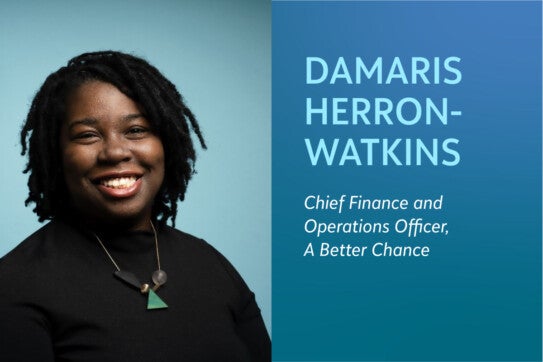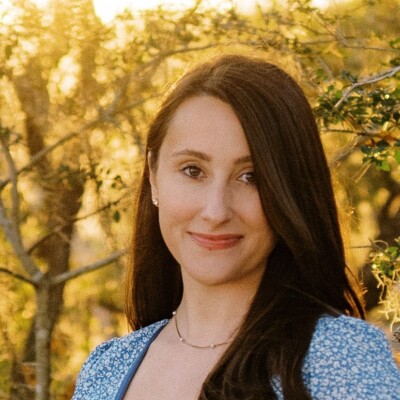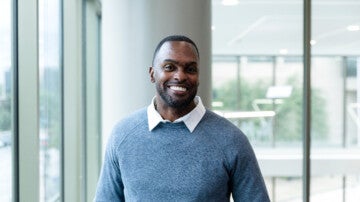Changemaker Spotlight: Damaris Herron-Watkins, A Better Chance

This Q&A series aims to provide readers with valuable insights from changemakers across the social impact community.
Damaris Herron-Watkins is the chief finance and operations officer at A Better Chance, an organization that provides transformational education opportunities to students from underserved communities.
Q1: What are the main responsibilities of your current role? What does a typical day look like for you?
I am responsible for finance, office operations, human resources and information technology. A typical day for me is usually lots of meetings! I try to organize my week where the top of the week is very meeting heavy—this helps set up the week’s priorities and surface any potential challenges—so that the back half of the week I can have focus time to work on reports, HR needs/requests, budgets, etc. However, I have to be flexible because anything can come up at any time. At this point I have mastered the pivot.
Q2: You recently spoke on Blackbaud’s Skills UP webinar series about leading through influence. What are some key things that nonprofit leaders can do to inspire their teams and encourage collaboration and innovation?
There are three things that I have found that have really helped my leadership: listening, modeling, and engagement.
We can’t move people if we are not engaging them. I say good morning every day when I come into the office. I don’t want to be this nebulous person to the staff, I want to be viewed as open and accessible. All senior leaders have an open-door policy. If I have a question about something or need clarification for a project, I will engage staff members directly to ask them their thoughts. That does two things, it helps them know I value their knowledge and expertise and two it models the behavior I want them to engage in with their colleagues.
I’m a firm believer that you cannot ask someone to do something if you yourself are not doing it or are unwilling to do it. I have a team for a reason but I pride myself on knowing how to do pieces of every role on my team. If we need to connect or disconnect a computer I will get under a desk. When we are building retreat curriculum I am right there with my operations manager. If our cleaning staff is looking for supplies, I head right to the closet to check inventory. If I’m trying to decide on an admin team outing, I send out a survey. It gives me credibility when I say “lets poll the team to see if we are on the right track instead of guessing” or “when I had to do xyz thing I reached out to so-on-so to work on it with me” or “this is how we did it when I first started out but if there is a better way I’m open to learning”. My team follows my lead because they see me doing what I am asking them to do.
Finally, if we are engaging and modeling, we have to listen. As leaders we have vision but it can be tunnel vision and then you end up being a bull in a China shop. A botched roll out of software taught me how crucial it is to listen and to listen without trying to defend or respond. Gathering information, checking for understanding, following up after to thank staff for their time. People want to be heard and giving them that space strengthens your leadership and engenders greater by in.
Q3: You just recently earned your Executive MBA while juggling your full-time job and a family—how did you make time and stay motivated throughout? And why was it important for you to achieve this goal?
I had so much support. My family (who I call my village), my team at work and my CEO all provided space for me to successful in this endeavor. The start was rough. I’ve gotten certifications throughout my career but I hadn’t been in a formal school setting since 2012. I forgot what that was like and had to re-learn it.
What kept me motivated was my son. When I would be doing my homework on Sunday afternoons, he would sit with me and read my course modules to me and he would be so proud of me when I passed a test. Those moments were so special to me and they kept me going. I wanted him and his sister to know that education is important, and finishing what you start is important. This year we were all able to graduate in June. Me from my program and them to their next grade.
My career path is very unconventional. My undergraduate degree is in applied mathematics, my graduate degree is in psychology and I started out in the nonprofit space as an intern. I was answering phone, fixing the copy machine when paper got jammed, doing mailings and slowly graduated to taking on event planning, accounting and finance responsibilities, I never took an accounting or business course. Often, when charting my path, I was making the case for why my lived work experience qualified me when others, with a traditional accounting or business degree, but less experience did not have to. This milestone, helps to solidify all that I have learned in practice.
Q4: You are a thought leader in the sector, having been a speaker, panelist, and moderator at conferences such as Nonprofit OpCon, bbcon, and Nonprofit BoardCon, and of course on webinars as well. What advice would you offer to those interested in building their professional platforms through public speaking, but may feel uncertain about how to begin?
Just start! Public speaking for me first started with my staff, leading workshops. I enjoy teaching and I wanted to provide more PD for our staff but when you work at a nonprofit where resources are limited you have to do stuff yourself more often than not.
I remember my boss coming to me and saying, you do so much internally, I want you to elevate your profile externally. That spun into external speaking and I started with moderation because, outside of my staff at A Better Chance, who really was interested in what I had to say? Lol. It was low stakes and I really enjoy getting a topic, developing a theme, and weaving peoples experience together so that they get to showcase their expertise and the audience gets practical, applicable tips from it.
Since then, everything has just grown from there and I’m just grateful that I get to engage with and in the sector this way. I get to meet and work with great people and I’m able to share my expertise. I’m also able to learn from theirs and often I get to meet alums of A Better Chance in the process which has been such a delightful surprise.
Q5: You are passionate about mentorship. What advice would you give to someone seeking out a mentor in their professional journey? And can you share the impact that a mentor has had on your career?
You can learn from any and everyone so be a sponge. I have been extremely fortunate to grown up and learn from and be around some incredible woman. At school, at church, my mom’s friends, family—I’ve learned from classically trained opera singers, recording artists, nurses, executives, sharecroppers and mathematicians—which in the world of mathematics is incredibly rare. I have also been blessed to work with some fantastic people over the course of my career who have been generous with their time and poured into me their knowledge and expertise. I just want to be able to pay it forward.
Don’t be afraid to ask a question or show that you are open to learning something new. Most people want to show you. Peggy Tseng Chen was my first real manager, an incredible administer and operations professional, and she taught me so much that I still use today in my work. I’ve modeled my CFO leadership style after Joanne Martz, an incredible finance and operations leader I had the privilege to work under. I was open to learning and growing and they were willing to take a chance on me and teach me.
All these interactions and touch points have enabled me to engage in both formal and informal mentorship. The best career advice I have ever received (and its really life advice) was, do it scared. The first time I stood in front of a crowd of people was to sing a solo at church. I was terrified, my leg shaking so bad I thought people could hear it in the microphone, but I did it. I didn’t have language for it at the time (I was 14) or know that this would be a theme for me but at each step of my journey, I’ve taken the leap and done it scared. Like I mentioned, my path has been unconventional but you miss every opportunity you don’t take. So, do it scared.
Q6: Besides your EMBA, what are some of your professional highlights from this past year? And looking ahead to the rest of 2025, what are you most looking forward to?
In the past year another professional highlight is that I was able to close a deal on space in NYC that has expanded our programmatic capacity. It took almost 6 months and closed in December of 2024. It was a lot of work—negotiations, meeting with Board members, financial modeling and forecasting—but seeing our families in the space meeting with our staff, building community with one another has been fantastic.
I’m looking forward to, in the back half of 2025, speaking at bbcon! I’m super excited about the opportunity and am grateful to have built should great relationships with Blackbaud and its partners and to be in the room learning with my peers.
Q7: How do you stay updated with the latest trends and developments in the nonprofit sector? Are there any resources or networks you recommend?
Relationship building is a core competency for our organization and we have been able to partner with some amazing organizations. A Better Chance is members of Nonprofit NY, Charity Navigator and other educational access specific entities like Enrollment Management Association (EMA) and National Association of Independent Schools (NAIS) which helps us really keep a pulse on that is happening in our sector and industry. I follow NYN Media and City & State which focuses on the public sphere. Our audit partners, GRF, have been an amazing resource for what is happening in the sector. I’m a member of SHRM, AICPA, and Forbes Finance Councils to keep my skills sharp and I follow and/or connect with people on LinkedIn who are in the space. I also attend conferences, whether virtual or in-person, and webinars to engage with my peers in the nonprofit space or even just in my industry. You learn so much just by being in rooms and on email lists, so I try to stay plugged in as much as I can.
Q8: What advice do you have for someone interested in moving into an executive nonprofit finance or operations role? What skills do you believe are essential to succeed?
The role I hold is a dual role that at larger organizations may be split. Having strong financial acumen or strong operational skills don’t necessarily require the same skillset. This dual role however requires you to find a way to thread the needle between the two. It’s a lot of strategy, technical skills, and soft skills. For most people I think the soft skills is the hardest part. Knowing how to do finance, human resources, tech, operations is the easy part (technical skills). But to be able to take what you do, zoom out to see its larger impact and then employ communication skills, EQ, collaboration, etc to execute a vision is what takes practice. You should not wait until you are in a leadership role to develop your soft skills. I had been practicing my soft skills to lead with influence long before I was a CFOO.
At the end of the day, I’m leading people and I need to bring those people along the journey with me. The numbers in my spreadsheet impacts families. The tech stack we have impacts the team and therefore those we serve. The benefits we provide should not just be cost effective but attract the talent we need to support the work we do. There is nuance, it’s not always black and white, so the greatest skills I believe are needed is the ability to marry the nuance to the bottom line and learn how to communicate with empathy to bring people along with you on the journey.



